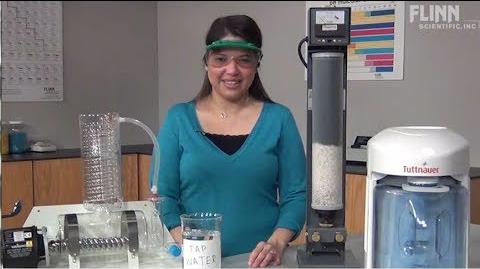
Distillation
About[]
The oldest method for production of pure water is the thermal method or distillation. The process is the transfer of water that is in evaporated phase with its subsequent condensation leaks into a flask tube. The main drawback of this method is the very high maintenance costs of the electricity needed to convert the water into the steam. In addition, in the process of steam formation along with water molecules other solutes can enter the steam according to their volatility. Evaporation is achieved in various ways: the vacuum above the water, heating, etc.
What’s happening in the process of distillation? The water molecules have the boiling point of 100°C or 212° F. The substance that boils at a lower temperature evaporates first. The boiling point of various impurities is higher, and, theoretically, they will begin to evaporate, when the water has already boiled out. The substance that boils at a lower temperature evaporates first. Due to this difference the water is separated. [1]
Clinical Use[]
Because distilled water is pure, it’s valuable in research since it is a constant and does not interfere with any chemical processes. Distilled water is used primarily as a solvent for reagent preparation, as a calibration standard, for cleaning testing equipment and rinsing an analyte, a substance whose chemical constituents are being identified and measured. Distilled water is used when making High Purity Water. It should be used in all equipment sterilization procedures. [2]Distilled and degassed water must be used as the coupling medium to obtain stable and accurate readings with the UW 5. [3] Additionally, the Rigel Multi-Flo Infusion Pump Analyzer is intended for use with distilled water [4]as well as the BC Groups IPA-1000 Analyzer[5]
Distilled water should never be consumed as drinking water since the distilled process does not remove toxic substances and pollutants (compared to municipally filtered drinking water.)
Reference[]
- ↑ Distilled and Deionized Water. "Deionized Water vs Distilled Water: What’s the Difference." Accesssdate 1/13/2015. http://www.distilleddeionizedwater.com/deionized-water-vs-distilled-water/
- ↑ BTS. "Distilled or Deionized Water? What’s the Difference?" Accessdate 1/13/2015. http://www.biotechserv.com/lab_equipment_blog/2013/06/12/distilled-or-deionized-water-whats-the-difference/
- ↑ Fluke Biomedical. UW5 User Manual. Feb 2006. pg. 3-5. http://assets.fluke.com/manuals/UW-5____omeng0000.pdf
- ↑ Rigel Medical. Multi-Flo User Manual. 2014. pg. 14. http://www.hospimedica.com/whitepapers/54552bcae6fd4_Guide%20to%20infusion%20pump%20testing%20Rev%201%20W.pdf
- ↑ BC Group International. IPA-1000 User Manual. 2014. pg. 3. http://www.bcgroupintl.com/BC_Biomedical_Manuals/pdf/IPA-1000_UM_Rev06.pdf
Links[]
Video[]

Distilled versus Deionized Water